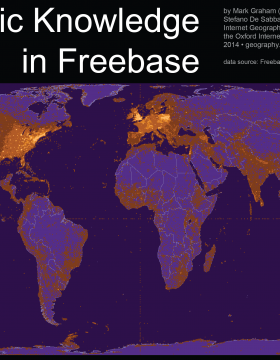Thanks to a note from Domenico Fiormonte to Humanist I came across the Information Geographies page at the Oxford Internet Institute. The OII has been producing interesting maps that show aspects of the internet. The one pictured above shows the distribution of Geographic Knowledge in Freebase. Given the importance of Freebase to Google’s Knowledge Graph it is important to understand the bias of its information to certain locations.
Geographic content in Freebase is largely clustered in certain regions of the world. The United States accounts for over 45% of the overall number of place names in the collection, despite covering about 2% of the Earth, less than 7% of the land surface, and less than 5% of the world population, and about 10% of Internet users. This results in a US density of one Freebase place name for every 1500 people, and far more place names referring to Massachusetts than referring to China.
Domenico Fiormonte’s email to Humanist (Humanist Discussion Group, Vol. 29, No. 824) argues that “It is our responsibility to preserve cultural diversity, and even relatively small players can make a difference by building more inclusive ‘representations’.” He argues that we need to be open about the cultural and linguistic biases of the tools and databases we build.
